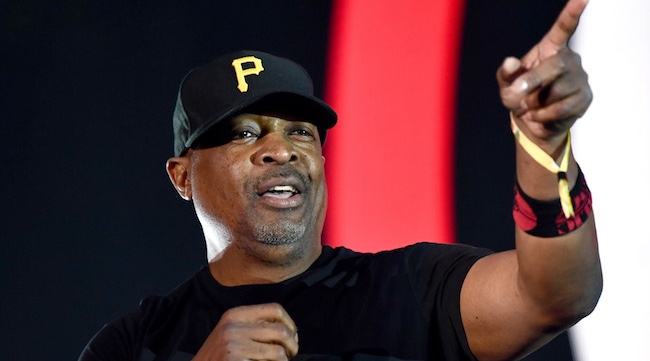
Former Public Enemy rapper and current Prophets Of Rage frontman Chuck D has long been one of hip-hop’s most outspoken voices when it comes to inequality and injustice. In a recent interview with HipHopDX, he addressed a subject that has been one of the genre’s hot-button issues since it began to skyrocket to forefront of pop culture over twenty years ago: The uneven wealth distribution between the highest-paid rappers and the majority of nose-to-the-grindstone, everyday MCs.
“As a structured organization, I wish the money was distributed to more people better,” he said. “To see Jay-Z and Puffy (aka Diddy, aka Love) have a playful argument about who’s going to be the top of Forbes, I look at my peer group and they’re just trying to get by. Look at a guy like Masta Ace who’s just trying to continue his art and feed his family, I just wish the distribution is a little less painful.”
Jay-Z recently passed Diddy on the 2018 Forbes annual List Of Hip Hop’s Wealthiest Artists thanks to his investments in Tidal, Roc Nation, and liquor brands. However, the fact that most of their money was made outside of music doesn’t distract Chuck D from his goal, which is to see more rappers and hip-hop figures being paid an equal share of the pie.
“It could be a lot more fair across the board. It’s the lack of administration. I was talking to [DJ] Premier, I said, ‘I do so much of this and it’s not based on money.’ Yeah, I go out with Prophets Of Rage and our job is to do our thing but everything else I do is painfully for free. Jay-Z and Puffy arguing about who has most money — something’s wrong with that. How many jobs have you created? Who are you paying and what are you doing for it? It all came out from the sacrifices we made for you.”
At least in the case of Jay-Z, that’s been the goal of the increased artist splits paid out by Tidal, while his Roc Nation imprint is home to a diverse array of talents which includes rappers like J. Cole, Big Sean, Vic Mensa, Jaden Smith, Rapsody, and Belly, all of whom have seen their profiles (and profits) rise from their association with the brand. Jay and Diddy have both advocated for Black artists to take ownership of their own brands and businesses, as well as make smarter investments while embracing financial responsibility.
Unfortunately for those underground or older rappers that Chuck refers to here, just selling CDs at shows isn’t always enough. While many of those rappers make a living from music, it becomes a lot harder to save and invest when the profit margins are so thin. On the other hand, there have never been more avenues for an artist to diversify their revenue through licensing, merchandising, songwriting, and other endeavors, and while streaming still doesn’t pay anywhere near what it probably should, by cutting out production cost of physical product, it does allow artists to squeeze a tiny bit more profit out of their craft. In 2018, there are more opportunities in hip-hop than ever, but they aren’t always as simple as rocking a mic.






